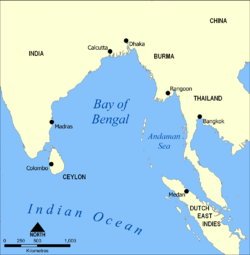Battle of Tellicherry
| Battle of Tellicherry | |||||||
|---|---|---|---|---|---|---|---|
| Part of the Third Anglo-Mysore War | |||||||
|
Location of the capture of Résolue |
|||||||
|
|||||||
| Belligerents | |||||||
|
|
|
||||||
| Commanders and leaders | |||||||
| Captain Sir Richard Strachan | |||||||
| Strength | |||||||
| Frigates HMS Phoenix and HMS Perseverance | Frigate Résolue and two merchant ships | ||||||
| Casualties and losses | |||||||
| 6 killed 11 wounded |
25 killed 40 wounded Résolue captured |
||||||
The Battle of Tellicherry was a naval action fought off the Indian port of Tellicherry between British and French warships on 18 November 1791 during the Third Anglo-Mysore War. Britain and France were not at war at the time of the engagement, but French support for the Kingdom of Mysore in the conflict with the British East India Company had led to Royal Navy patrols stopping and searching French ships sailing for the Mysorean port of Mangalore. When a French convoy from Mahé passed the British port of Tellicherry in November 1791, Commodore William Cornwallis sent a small squadron to intercept the French ships.
As the British force under Captain Sir Richard Strachan approached the convoy, the escorting frigate Résolue opened fire. A general action followed, with Strachan succeeding in forcing the French ship to surrender within twenty minutes and both sides suffering damage and casualties. All of the French vessels were searched and subsequently returned to Mahé, the local French authorities reacting furiously at what they perceived as a violation of their neutral position. Messages were sent back to France reporting the action from Commodore Saint-Félix but they evoked little response. Although under normal circumstances the battle might have provoked a diplomatic incident, the upheavals of the ongoing French Revolution meant that the despatches had little effect.
In December 1789, after five years of diplomatic wrangling about the terms of the Treaty of Mangalore that had ended the Second Anglo-Mysore War, the ruler of Mysore Tipu Sultan again declared war on the British East India Company and their allies in Southern India. For the next two years the war continued as British forces and their allies drove the Mysore armies back towards the capital of Seringapatam. Both sides were reliant on supply by sea to maintain their campaigns inland: the British forces were supported from their major ports at Bombay and Madras, later stationing additional forces at the small port of Tellicherry inside Mysore territory. The Mysorean forces were supplied through Mangalore by French ships. France had been an ally of the Tipu Sultan's father Hyder Ali during the Second Anglo-Mysore War and although the political instability caused by the French Revolution in Europe prevented active involvement, they ensured that their ships kept up a supply of equipment to Mysore throughout the war.
...
Wikipedia

